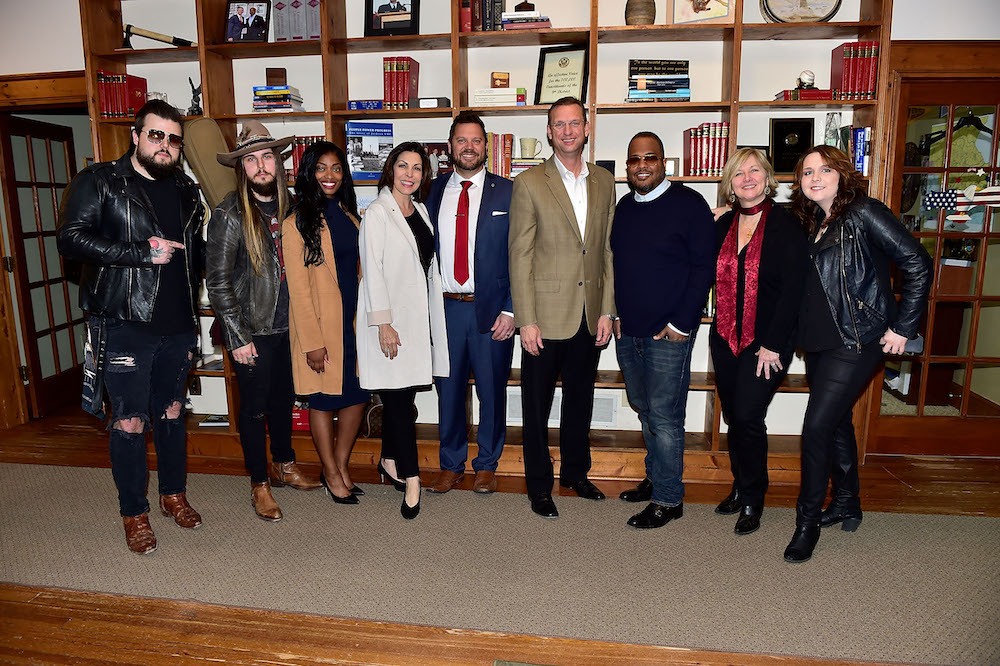
20 Apr OPINION: Why The Music Modernization Act Needs Media Support
Today we celebrated another #GRAMMYsOnTheHill where members of The Recording Academy such as artists, songwriters, producers, and engineers reminded Congress that current music legislation needs to be updated in order for music creators to properly get compensated. The Music Modernization Act is currently at the center of Congress and with coverage from the media, I am most certain we will get them to pass this bill and make 2018 the year we modernize music legislation.

Representative Doug Collins pose photo with recording academy members Trey Bentley, Andrew Bentley, Tami LaTrell, Michele Caplinger, Tai Anderson, Rep. Collins, Chris “Tricky” Stewart, Diane Durrett, Hannah Thomas on March 26, 2018 in Gainesville, Georgia. (Photo by Moses Robinson/WireImage)
It’s safe to say as a country, we failed to consider technology’s effect on music and how it would literally shatter the music industry. The Music Modernization Act is a chance to make it right for creators. To give us hope again.
Aside from the drastic decline in physical sales affecting the health of the music industry, the increase in unregulated digital streaming destroyed the integrity of music’s fabric in America.
It’s freaking “survival of the fittest” out here…But no one is talking about this.
I applaud streaming companies like TIDAL, Rhapsody, and XBOX music for paying out higher royalty rates than the other popular streaming giants Spotify, Pandora, and Apple Music but it’s not enough – songwriters, artists and producers deserve more.
- Currently, publishers are not always obligated to share royalties from unmatched work (underlying music) with songwriters. Under the MMA, songwriters are obligated under law to receive at least 50% of all royalties for unmatched works.
- When ASCAP and BMI cannot negotiate performance royalties with licensees, they go in front of the same two rate court judges, who decide their royalty rates. The MMA Proposes that when ASCAP and BMI go to rate court, they can be randomly assigned to any federal judge instead of being stuck with the same one who decides their rates. This is referred to as “the wheel” and benefits us because the DSPs and other licensees won’t be able to game the system by going to a judge they believe will give them a more favorable rate.
- Currently, mechanical royalty rates are set using an outdated four-part formula (801(b), resulting in below-market rates. Under the MMA, rates will be based on what a willing buyer and a willing seller would agree to reflect market negotiations which substantially increases our compensation.
- Currently, songwriters have no involvement in or direct influence over the mechanical licensing system. Under the MMA, Songwriters have positions on three boards governing the operation of the licensing entity:
- Self-published songwriters will have four seats (out of fourteen) on the licensing entity board of directors.
- Songwriters comprise half of an advisory committee (five of ten seats) overseeing the unclaimed royalties process.
- Songwriters comprise half of a dispute resolution committee (three of six seats), which oversees and resolves disputes over ownership of musical works and distribution of royalties.
- Rate Courts setting public performance royalties for musical works cannot consider all market evidence, including sound recording rates, when determining songwriter compensation. The MMA proposes that courts can now consider all market evidence, including sound recording royalties, when setting rates for public performances of musical works. This was another key provision in the Songwriter Equity Act which should help songwriters get higher payments going forward.
- Digital service providers (DSPs) such as Spotify and Apple Music have been avoiding paying for works that aren’t registered with the Copyright Office by sending large quantities of Notices of Intent (NOIs) as a loophole. With the MMA, the DSPs will now be required to pay for all uses of our works, even if they cannot find an owner, rather than avoiding payments.The MMA also establishes a clear process through which copyright owners can claim ownership of songs and receive royalties that DSP’s are just sitting on as unmatched and unclaimed.
- Currently, there is no transparency of mechanical rights ownership information for copyrighted works. The MMA will enforce a free, public, searchable database of musical works with mechanical rights ownership information. This will help songwriters get paid accurately for use of their works.
- Currently there is no right to audit the digital music providers’ usage of music and royalty payments. The MMA will ensure new licensing entity can audit digital services to ensure proper reporting and payment of royalties. Copyright owners will be able to audit the licensing entity to ensure that they are being paid accurately. Both audit rights ensure that songwriters are able to get answers about whether they are being paid accurately.
-
The Allocation for Music Producers (AMP) Act, creates a way for producers and engineers to receive direct payments from SoundExchange when recordings are used on satellite radio and online radio services like Pandora. Remarkably, it will be the first time producers and engineers are mentioned in U.S. copyright law.
-
The CLASSICS Act, The law would close a flawed loophole that leaves classic artists out of the federal copyright system. Currently only sound recordings made after 1972 receive payments from digital radio services under federal law. So for example, SoundExchange would distribute royalties for pre-‘72 recordings played by Internet, cable and satellite radio services just as it does for post-‘72 recordings.
-
The Fair Play Fair Pay Act which require artists be paid for songs played on broadcast radio, heretofore considered “promotional.” Well unfortunately, according to Variety.com, that provision – strongly opposed by the National Association of Broadcasters and championed by the Recording Academy – will presumably be addressed separately…

GAINESVILLE, GA – MARCH 26: (L-R) Representative Doug Collins and Tami LaTrell meet at Representative Doug Collins office on March 26, 2018 in Gainesville, Georgia. (Photo by Moses Robinson/WireImage) *** Local Caption *** Doug Collins,Tami LaTrell
A special thanks to Congressman Doug Collins for being the driving force behind the MMA.
